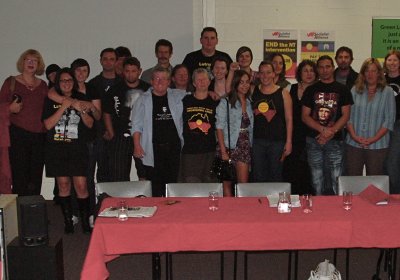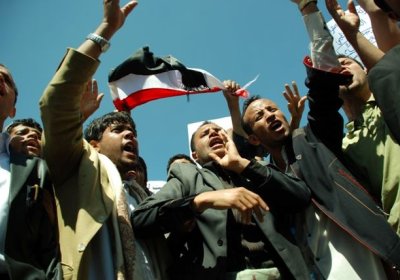HOBART — About 20 people attended an Aboriginal rights forum organised on February 24 by the Socialist Alliance.
The forum heard from a panel of representatives from the Tasmanian Aboriginal community and explored a range of issues they are campaigning around, including the Brighton Bypass, heritage issues and the NT intervention.
871
The Greens candidate for Heathcote in the NSW elections, Phil Smith, has renewed his party’s call for a moratorium on coal seam gas mining in the state.
He said gas extraction poses real risks for communities throughout the Heathcote electorate, a seat that spans from southern Sydney to the northern Illawarra.
The Labor state government recently approved 15 coal seam gas wells in the northern Illawarra region.
“The Greens are leading the call for an immediate moratorium,” Smith told Green Left Weekly.
One hundred people, including many from the Latin American community, ex-ALP members, members of the Greens, plus members of Newcastle, Wollongong, and several Sydney branches of Socialist Alliance, helped launch the SA’s campaign in the NSW state election on February 26 at St Lukes Hall in Enmore.
Hosted by lead SA Legislative Council candidates Peter Boyle and Jess Moore, the night featured music, theatre, political speeches and more.
The night was also about people-powered culture, with performances from the Freedom Fighters and Newcastle-based band GRCO.
A NATO airstrike killed nine children collecting firewood in eastern Afghanistan on March 2, Afghan officials have said.
A March 2 WashingtonPost.com article said the deaths in Konar province “became the latest irritant in the tense relationship between President Hamid Karzai and the international force in the country”.
The top NATO commander, US general David Petraeus, issued an apology for the error, which the occupying forces blamed on “faulty communication”.
The federal government’s expansion of income management in the Northern Territory has created new barriers for Aboriginal people who want to get off its welfare control scheme.
The rollout has also affected hundreds — possibly thousands — of others, including residents of Darwin and Alice Springs and newly arrived refugees.
In a joint statement on February 25, indigenous communities that make up the Native Federation of Madre de Dios River and Tributaries in south-eastern Peru rejected a military crackdown on illegal mining on their lands.
The statement said it was a “false solution to a problem that has social and economic roots”.
Environment minister Antonio Bracks authorised the operation in mid February —involving about 1000 police and infantrymen — to destroy illegal mining equipment including bombing of dredges.
A rally was held on February 28 to protest against the recent decision of a London court to extradite WikiLeaks editor-in-chief Julian Assange to Sweden to face questioning on allegations of sexual assault.
Assange’s legal team announced it would appeal the decision.
The rally was held under the themes "We deserve the truth!”, “Hands off WikiLeaks!” and “Free Julian Assange!"
MELBOURNE — About 200 people marched against the NT intervention and for equal pay and jobs with justice for Aboriginal workers on March 4.
The rally was organised by the Melbourne Anti-Intervention Collective. It demanded an end to the exploitation of Aboriginal workers in the Northern Territory.
The intervention, which quarantines the welfare payments of targeted people,
has meant that Aboriginal people are in effect working for rations cards while living in extreme poverty.
Tens of thousands of people have taken to the streets of Yemen in anti-government protests. Demonstrators have demanded an end to the long-running regime of President Ali Abdullah Saleh.
Yemen’s coalition of political opposition parties, the Joint Meeting Parties (JMP), finally joined the protests in late February. This came after a speech in which Saleh, who has ruled Yemen for more than 30 years, blamed uprisings on a conspiracy by foreign governments — specifically the United States — to destabilise the nation.
David Hicks was one of the first “war on terror” detainees to be sent to the US military prison at Guantanamo the day it opened in January 2002.
In a February 16 article, Truth-out.org’s Jason Leopold introduced Hicks as “the Australian drifter who converted to Islam, changed his name to Muhammed Dawood and ended up at training camps in Afghanistan the US government said were linked to al-Qaeda, one of which was visited by Osama bin Laden several times.
On March 8, women’s rights campaigners around the world will celebrate the 100th International Women’s Day (IWD).
There could be no more fitting testament to the meaning of IWD than the words of one of the thousands of Egyptian women who joined the democracy protests in Tahrir Square in Cairo last month. The people’s struggle to be rid of dictator Hosni Mubarak, she said, is also a struggle for women’s rights: "[Before] we had nothing, now I guess we will take everything."
IWD was born in a time of great social turbulence and huge struggles by ordinary people for a better life.
Pro-democracy protests have escalated in Bahrain after the US threw its support behind the monarchy and tanks from Saudi Arabia were seen entering the country.
Up to 200,000 people marched in the capital, Manama, on February 25, The New York Times said that day — a staggering size given Bahrain's population is only 1.2 million, and more than half of these are foreign guest workers. The protesters converged on Pearl Roundabout in two huge crowds.
- Page 1
- Next page









